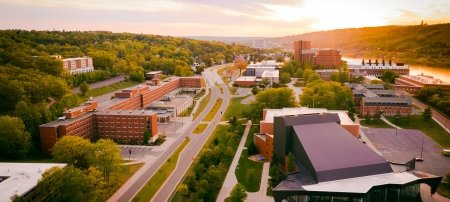Michigan Tech will receive $4.3 million to help the state of Michigan expand sequencing for COVID-19 and other infectious diseases.
The Michigan Department of Health and Human Services (MDHHS) announced today that four Michigan universities will receive $18.5 million in federal funds over the next two years to collect and analyze genomic data to address emerging infectious disease threats and enhance the state’s ability to respond to those threats.
Michigan Technological University, Michigan State University, the University of Michigan and Wayne State University will use the funding to increase sequencing capacity in the state — starting with SARS-CoV-2 and then expanding to other infectious disease threats with potential for broad community spread.
Funding for the Michigan Sequencing Academic Partnership for Public Health Innovation and Response (MI-SAPPHIRE) is through a Centers for Disease Control and Prevention (CDC) Epidemiology and Laboratory Capacity grant MDHHS received. MI-SAPPHIRE activities will include sequence generation and analysis, such as sample collection and sequencing; data processing, storage and sharing; and data interpretation and analytics.
“The COVID-19 pandemic has highlighted the importance and need for genomic sequencing, surveillance and epidemiology capacity both globally and right here in Michigan,” said Elizabeth Hertel, MDHHS director. “The MDHHS Bureau of Laboratories has rapidly expanded its efforts to identify COVID-19 variants since the start of the pandemic to support public health actions. MI-SAPPHIRE will allow our state to expand sequencing and analysis capacity and the number of pathogens that undergo routine sequencing, and ensure we are sampling diverse geographic areas across the state.”
“Michigan Tech continues to be a leader in the Upper Peninsula for providing community resources during the COVID-19 pandemic,” said Caryn Heldt, the James and Lorna Mack Endowed Chair of Cellular and Molecular Engineering at Tech and the director of the University’s Health Research Institute. “For 20 months, the University provided community and campus testing for the virus. Now, with the support from the state and federal government, we will develop the infrastructure to provide sequencing capacity for the state health agencies.
“While we will start with SARS-CoV-2 sequencing, the capacity we are building will then be used to sequence other pathogens, ranging from drug-resistant gonorrhea to zoonotic diseases, like avian influenza,” Heldt said. “Collectively, Michigan Tech has expertise in genomic sequencing, zoonotic diseases and the computational infrastructure needed to store, catalog and evaluate large genomic datasets. Combine this expertise with the relationships we have with local providers and the Western Upper Peninsula Health Department, and we are excited to help the state scale their capacity and continue to support our community in response to the COVID-19 pandemic and in addressing future health threats.”
Michigan Tech's research team includes Heldt, her co-principal investigators Dukka KC and Hairong Wei, and senior researchers Kristin Brzeski, Guy Hembroff, Kelly Kamm, Stephen Techtmann and Kui Zhang.
Michigan Technological University is an R1 public research university founded in 1885 in Houghton, and is home to nearly 7,500 students from more than 60 countries around the world. Consistently ranked among the best universities in the country for return on investment, Michigan's flagship technological university offers more than 120 undergraduate and graduate degree programs in science and technology, engineering, computing, forestry, business, health professions, humanities, mathematics, social sciences, and the arts. The rural campus is situated just miles from Lake Superior in Michigan's Upper Peninsula, offering year-round opportunities for outdoor adventure.






Comments